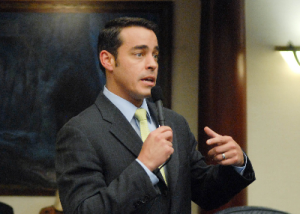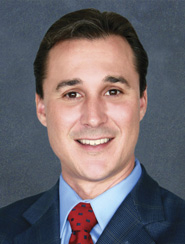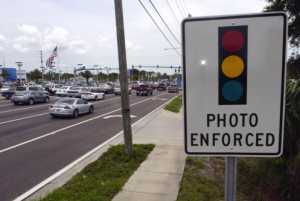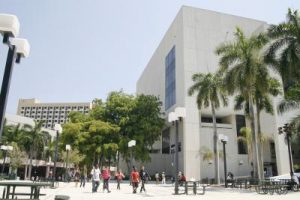It looks like this year’s legislative session in Tallahassee, which opens Tuesday, is going to be a little smoother than last year’s.

While there seem to be some arguably controversial bills in the pipeline — we have gaming, medicaid, sports stadiums, red lighht cameras, a sales tax for higher education — not many seem to be getting the hyper attention we saw in 2013. And that may indicate that none of them have much traction, according to most of the 15 political observers — local electeds, state legislators, consultants, lobbyists and activists — Ladra spoke to in the past week.
The usually muy caliente topics seem to be lukewarm this year. And some observers think that in this election year — where the majority GOP is looking to make up ground lost last year — the House will be unwilling to take the bullet for anything, especially those big pet projects with similarly sized price tags, and would rather kick the can down the road.

Soccer stadiums? State Rep. Erik Fresen‘s bill to give two new Major League Soccer team stadiums tax rebates for the next 30 years is not expected to move up the field. Rather, legislators are more willing to hear a proposal that would create a competitive process for new stadiums to “compete” for a pool of funds. It seems like a fraud, a set up that basically puts the power for this in the Division of Business Regulation. Legislators can say “We didn’t give millionaire sports team owners public money. The state did.” But they will approve the budget. Watch David Beckham and Stephen Ross, owner of the Miami Dolphins — whose stadium ask was denied last year — lining up for public funds in 2015, and getting them. Why else do you think Ross and his lobbyist are not stirring up anything this year, after promising (read: threatening) to be back?

Medicaid expansion? Sen. Rene Garcia‘s bill would expand Medicaid in Florida — the state with the most Obamacare sign-ups in the country — so that those who qualify for government subsidized healthcare (and didn’t know it until now), can be covered. But, say Republican sources who call Garcia a RINO, when you read the fine print in the pass-through, the state is still liable for 10 percent, which is in the tens of millions of dollars. Nobody in this GOP-led legislature is going to let the dreaded Obamacare cost the state millions of dollars in more, albeit deserved, welfare. Especially since they plan to use anti-Obamacare rhetoric in campaigns across the state, especially if it works for David Jolly in St. Petersburg against Alex Sink in what the most recent polls said was a neck-and-neck race in a special election set for March 11.
Gaming? The Senate bill to create two new casino resorts in the state will die without a companion in the House, whose special gaming committee convened just for this issue has not yet met. But there is already a lot of blowback on the bill, which gives everything to the new casinos but nothing to established gaming halls like the Havenick family’s Magic City. Expect some heavy lobbying against it. And call Ladra cynical, but that could be even more important in an election year. Critics say this bill was practically written to fail. Besides, House Speaker Will Weatherford has said he doesn’t want to deal with gambling expansion until Gov. Rick Scott has renegotiated the compact with the Seminole and Miccosukee tribes. That’s not likely to happen in the next 60 days.
Red light cameras? Rep. Frank Artiles (R-Country Walk) has co-sponsored a law that would ban red light camera programs because they are more commonly seen as revenue generators for cities rather than safety measures for drivers. Municipalities who already have these programs and count on the income for the b udget — or Miami-Dade County, which is looking to put hundreds of them on the streets of unincorporated Miami-Dade — will likely lobby against it. But they won’t be the only ones. Ladra bets the companies who make millions of dollars from the industry will send an army of paid advocates to make their case on this issue. It may die. Or it may be amended for compromise (read: watered down) to simply provide more regulation and a uniform appeals process.
udget — or Miami-Dade County, which is looking to put hundreds of them on the streets of unincorporated Miami-Dade — will likely lobby against it. But they won’t be the only ones. Ladra bets the companies who make millions of dollars from the industry will send an army of paid advocates to make their case on this issue. It may die. Or it may be amended for compromise (read: watered down) to simply provide more regulation and a uniform appeals process.
Pension reform? Didn’t work last year and it seems doomed again this year, even though the House cut first responders out of the overhaul that would move new hires to a 401k style investment plan rather than the Florida Retirement System. What they don’t say is that this would weaken the FRS for the police, firefighters and paramedics who can stay with it. Public employees are going to lobby hard against this again. And without the Senate support it seems doomed out of the gate.
Charter school expansion? A bill to limit the local school boards’ ability to negotiate and set guidelines for charter schools would basically create a process that would only help more for-profit school companies come to Florida and those who are here expand. But the move to leave local elected school district leaders out of the loop does not sit well with many and has given some Republicans enough reason to vote against it.
Miami-Dade College sales tax? This one has more of a chance. Fresen’s bill to levy an extra half penny in Miami-Dade for MDC and Florida International University (FIU gets 10 percent) has cleared three committees and his headed to  the House floor, and the Sen. Anitere Flores sponsored Senate bill — which passed last year — is headed to its third committee. Ladra does expect a little heated debate, at least at the House. And not because of merits. It’s a great school. Ladra is an alum. And who wants to go against teachers and a college that makes higher education accessible to more people and that has become part of our landscape? But, on the downside, it’s the biggest single tax giveaway the state has ever considered: Nearly $225 million every year for five years — or $1.1 billion — mostly for new construction (can’t you just see the LBA salivating?). That is why State Rep. Carlos Trujillo (R-Doral) voted against it in committee. He may be in the minority, however. Legislators may feel more willing to approve it because it still needs to get a pass by a majority of voters here. And the public could be weary of passing yet another tax increase after the school bond passed in 2012 and the Jackson $830-million bond passed last year. But that all depends on the publicity campaign Miami-Dade does and whether or not there is any opposition. I mean, it could win if the ballot says “Do you want to pay another half penny in sales tax to benefit education?” But it might be harder if it says “Do you want to pay an additional $1.1 billion in taxes to possibly create a slush fund for Miami-Dade College?”
the House floor, and the Sen. Anitere Flores sponsored Senate bill — which passed last year — is headed to its third committee. Ladra does expect a little heated debate, at least at the House. And not because of merits. It’s a great school. Ladra is an alum. And who wants to go against teachers and a college that makes higher education accessible to more people and that has become part of our landscape? But, on the downside, it’s the biggest single tax giveaway the state has ever considered: Nearly $225 million every year for five years — or $1.1 billion — mostly for new construction (can’t you just see the LBA salivating?). That is why State Rep. Carlos Trujillo (R-Doral) voted against it in committee. He may be in the minority, however. Legislators may feel more willing to approve it because it still needs to get a pass by a majority of voters here. And the public could be weary of passing yet another tax increase after the school bond passed in 2012 and the Jackson $830-million bond passed last year. But that all depends on the publicity campaign Miami-Dade does and whether or not there is any opposition. I mean, it could win if the ballot says “Do you want to pay another half penny in sales tax to benefit education?” But it might be harder if it says “Do you want to pay an additional $1.1 billion in taxes to possibly create a slush fund for Miami-Dade College?”
Ballots should be more blunt. I’d like to see a bill on that. Maybe next year.
This year, we may see some heavy discussion and political interests — at the 305 level anyway — over legislation that  would limit the ability of the Miami-Dade Expressway Authority, or MDX, from issuing bonds or increasing tolls. Sponsored by State Rep. Jeanette Nuñez (R-Doral) and Sen. Rene Garcia — basically slapping the MDX for its snub last year of 22 elected officials who practically begged them not to hike rakes — the companion bills would also reduce the number of members on board from 13 to nine and forbid them from serving on a state board, which former Miami Mayor and MDX board member Maurice Ferre sits on.
would limit the ability of the Miami-Dade Expressway Authority, or MDX, from issuing bonds or increasing tolls. Sponsored by State Rep. Jeanette Nuñez (R-Doral) and Sen. Rene Garcia — basically slapping the MDX for its snub last year of 22 elected officials who practically begged them not to hike rakes — the companion bills would also reduce the number of members on board from 13 to nine and forbid them from serving on a state board, which former Miami Mayor and MDX board member Maurice Ferre sits on.
That legislation could draw out a heated discussion — here. But Ladra expects it to get a pass in Tallahassee.
Other uncontroversial bills will pretty much fly through: Sexual predators will have loopholes closed, hit and run drivers will face stiffer penalties, adult living facility operators will have to heighten their reports of abuse and neglect, flood insurance companies will be allowed to come into Florida to sell competitive policies and immigrant children will get to pay in-state tuition at state colleges.
Even though this last one faces an uphill climb in the Senate, Ladra thinks that even Republicans on an election year will figure its not so damaging. After all, it’s not like they’re providing a path to citizenship. It’s just a break on tuition costs that will benefit state schools with an influx of more students. Miami-Dade College President Eduardo Padron should be lobbying for that.
But Ladra fully expects the session to start Tuesday on a positive note, with the passage of legislation that further reforms ethics in government. It would require board members and other appointed positions to adhere to the same financial disclosure laws — and penalties — as electeds and address one of Ladra’s ped peeves: Residency deadbeats. Or, rather, state representatives and senators that live in districts other than the ones they were elected in.
Good thing for State Rep. Eddy Gonzalez, who still lives in his old house despite redistricting that moved him out, that this is his last term.
